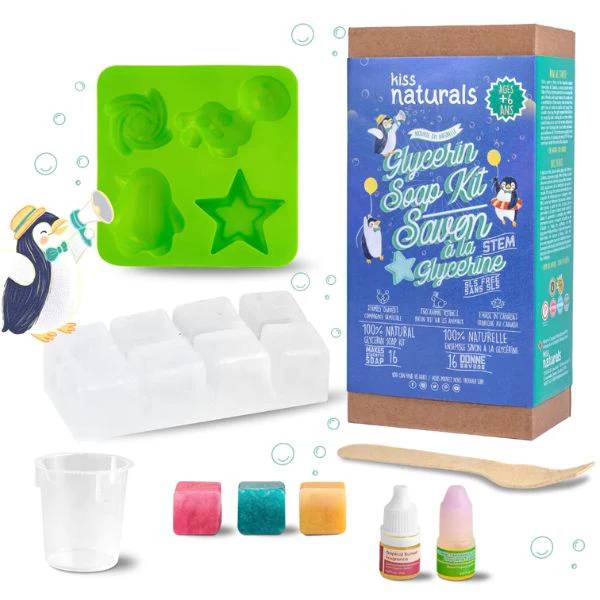Diving into the world of handcrafted soap feels like unlocking a centuries-old craft that blends creativity, sensory pleasure, and practical skill. Whether you’re exploring a new hob, planning to launch a small-batch brand, or searching for a thoughtful gift, choosing the right soap making kit can shape your entire experience. Below is an in-depth guide that walks you through the best options, essential supplies, and everything you need to know to begin.
Top Soap Making Kits Worth Considering
Today’s market is overflowing with kits designed for complete beginners, aspiring artisans, and eco-conscious creators. The best ones typically include molds, base oils, safety gear, instructions, and aromatic add-ons. High-quality kits often stand apart thanks to their clarity, sturdy materials, and a thoughtful selection of ingredients that help you skip the trial-and-error phase.
1. All-Inclusive Melt-and-Pour Starter Sets
These sets are perfect for newcomers who want quick results without diving into the complexities of chemical reactions. They typically come with pre-made soap bases, allowing you to simply melt, customize, and mold. You’ll appreciate how swiftly they produce silky bars ready to wrap and gift.
2. Cold-Process Artisan Kits
These kits are geared toward people who want to experience soapmaking from scratch. They provide pure oils, lye, protective gear, and molds designed to withstand heat and cure time. Expect a kit like this to offer deeper gratification and enhanced customization.
3. Organic and Botanical Craft Kits
These feature plant-based oils, natural colorants, and eco-friendly packaging. They appeal to those who want unrefined simplicity, gentle formulas, and clean ingredient lists.
What Supplies Do I Need for Soap-Making?
Even with a kit, understanding the essential tools helps you craft more intentionally. Typical supplies include:
- Base oils such as olive, coconut, or avocado
- Lye (sodium hydroxide) for cold-process soap
- Heat-safe mixing bowls
- A digital scale for accurate measurements
- Silicone molds
- A stick blender for emulsifying your mixture
- Protective gear like gloves, goggles, and long sleeves
- Fragrance or essential oils
- Colorants (micas, clays, or botanicals)
Each piece of equipment contributes to the safety, polish, and predictability of your final product.
Is Making Soap Profitable?
It can be—if you approach it strategically. Handmade soap often commands premium prices thanks to its artisanal quality, unique formulations, and small-batch appeal. Many makers turn their craft into a satisfying side hustle or even a full-time venture.
Profitability typically hinges on:
- Sourcing ingredients in bulk
- Developing signature fragrances or specialty bars
- Branding that resonates with a niche
- Understanding curing time and production pacing
- Building a strong online presence
While the startup costs are modest, success comes from consistency, creativity, and smart marketing.
How Do I Start Making My Own Soap?
To launch into soapmaking:
- Choose your method—melt-and-pour if you want instant gratification, cold process for the full artisan experience.
- Gather materials—either from a kit or individual supplies.
- Study the basics—especially safety if working with lye.
- Follow a recipe thoughtfully—measure carefully and blend patiently.
- Pour into molds—executing your design with precision.
- Allow time to cure—cold-process soaps need several weeks before use.
As you gain confidence, experiment with swirls, add-ins, and scent pairings.
What Are the Best Fragrances for Soap Making?
Fragrances set the mood of your soap and often help define your signature style. Popular options include:
- Lavender for calm
- Lemongrass for freshness
- Eucalyptus for clarity
- Vanilla for warmth
- Peppermint for energy
- Citrus blends for brightness
- Cedarwood for depth
- Rose for elegance
Essential oils provide a natural aroma, while fragrance oils offer broader, longer-lasting possibilities.
What Is Cold Process Soap Making?
Cold processing is a traditional method that blends oils and lye to trigger saponification—a chemical reaction that transforms liquid ingredients into solid bars. This technique gives you complete control over formula, texture, and aesthetic. Because the reaction generates heat on its own, there’s no need to cook the mixture. After pouring into molds, the soap cures slowly, developing hardness, gentleness, and longevity.
What Is the Best Organic Soap Making Kit?
A standout organic kit usually features:
- Certified organic oils
- Natural botanicals
- Plant-derived colorants
- Essential-oil fragrance blends
- Recyclable molds and packaging
The best kits combine purity with performance, guiding you toward bars that feel wholesome, nourishing, and authentically handcrafted.
Crafting soap blends creativity with utility in a way few hobbies can match. Whether you’re experimenting with indulgent scents, exploring organic formulas, or building a budding home business, selecting a thoughtful kit can transform your efforts from simple curiosity to satisfying mastery.



